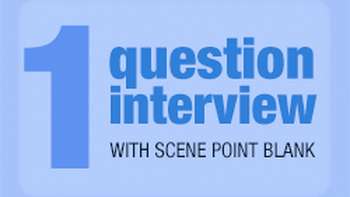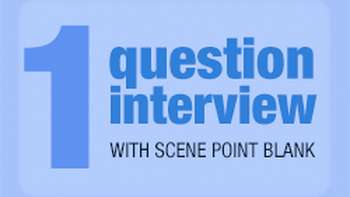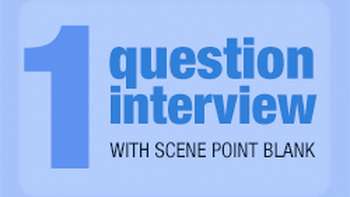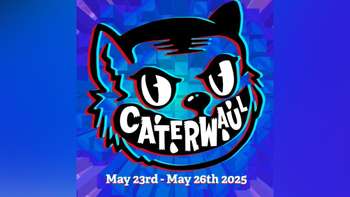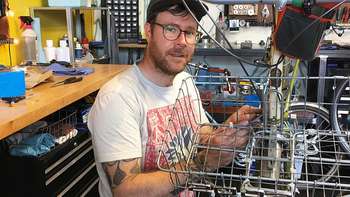Shellshag is a two-piece band that formed in 1997, featuring Jennifer Shagawat and John "Shellhead" Driver, aka “Shell” and “Shag.” A lot changes over two decades, but in the time Shellshag has maintained its focus on independence and DIY ethics. This interview talks a bit about how the concept of bands, the artistic process and creation. But it’s about a whole lot more too.
While Shellshag is an established entity at this point with an established sound, their unique approach continues to evolve. New album FUTQ marks a new chapter: a new year, a new way of putting together a new album, and a new outlook on taking back control of their digital catalog.
They say the new year is a time of reflection. In this two-part interview, part one explores how Shellshag reflected on the current music model how they feel bands can regain control in the streaming era.
Check back in a couple weeks for part two, which delves deeper into FUTQ, which released on December 31. All questions were answered collectively by the band over email correspondence throughout 2020.
"We are choosing to stay in the underground,
feeling alone enough to fear that it no longer exists"
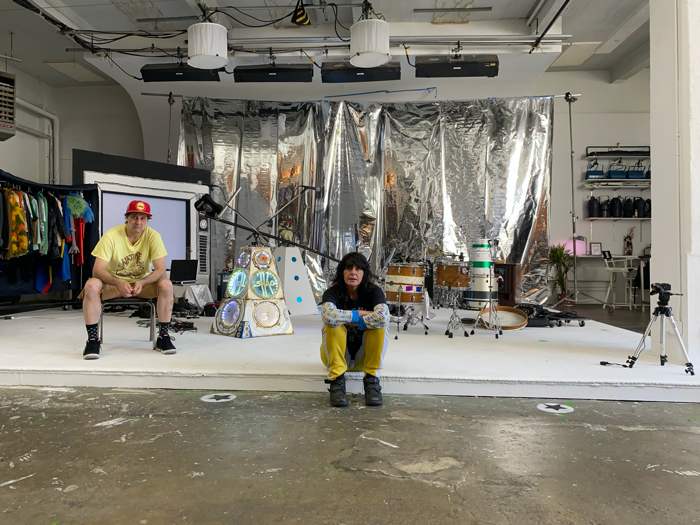
Photo by Shellshag
Scene Point Blank: In an era of increased digital everything -- and Bandcamp drawing a lot of attention for waiving fees -- you've elected to pull out of most digital platforms. What led to this decision?
Shellshag: It is important to us that people know that the global pandemic did not play a part in our decision.
We pulled out before Bandcamp waived any fees, before news of the coronavirus, in October of 2019. We had our digital distributor, Orchard Music, remove us from all 80-plus digital stores and platforms.
It was a feeling inside that something was wrong that led us to investigate how our music was being distributed. This led to our understanding of how our original intention in 2008, of making ourselves available digitally online, mostly via iTunes, had blossomed into an entirely different operation of renting our music via streaming services that were underpaying us and all other independent bands who accidentally participated in this system.
The fact that everyone was distributed into this system without an opportunity to discuss the details collectively, both nationally and globally, and without an opportunity to weigh our options as a cultural force, separate from corporations and mainstream radio music, should not be overlooked nor underestimated as a major cause of the loss of magic, money and power within our independent art communities around the world.
"Maybe it isn’t the streaming system that is at fault here.
Maybe it is how we are using that system that is the problem."
If you are a truly independent like Shellshag, then you don’t have a lawyer on this 24/7, as Neil Young urged in his book Waging Heavy Peace. Without a highly informed ally watching after our interests, we feel undereducated and underpaid. We were never asked if we wanted to be distributed in this way by Orchard, and I don’t believe any other record labels or bands were offered an option from their distributors either. One example of a choice we could have made, is to have banded together and asked digital distributors to work for us under our own business model separate from the corporate mainstream. This is what we would ask for now.
Scene Point Blank: Why are you sticking with Bandcamp for now?
Shellshag: We are sticking with Bandcamp for now because it is fair; it is not a part of the digital distribution market, and we can upload and control all our content without getting middled. We think Bandcamp has an interest in helping bands to help themselves and that their business model reflects that.
Until more independent bands and labels band together with us to form a new business model that is healthy and profitable, Bandcamp is the best we can do. Bandcamp and YouTube. Both allow us to upload and control our content as well as giving us options to monetize our own work or not.
Moving forward, we are asking ourselves these questions:
How come Bandcamp allows one to load music directly to their page, but Spotify and other streaming services can only be reached by a digital distributor?
Is it because the distribution companies are complicit in the business model of streaming services like Spotify and Amazon?
We think so. They ultimately are the ones who agreed to this business model on behalf of the bands and record labels they represent. They’re making money from both sides, why would they oppose?
"Who is working for who?
And why are distributors and stores getting all the money?"
Unlike all the services distributors get music to, Bandcamp stands alone. [It] is one of few online music sites that digital distributors do not distribute to, nd offers an alternative to what has become the status quo. Therefore it is our best option for protecting ourselves from the negative effects of having all music ever created under one umbrella.
Compare the music streaming industry to the movie streaming industry: None of the movie streaming services have all the movies ever made available in one place. There are many TV/ movie streaming sites popping up, and they all offer something exclusive. That is healthy competition.
How come YouTube allows both independent uploading and works with digital distribution companies?
YouTube is a much larger company than Bandcamp and it has existed for longer, so it seems that YouTube is willing to work with distributors, but is unwilling to stop independent users from uploading content. YouTube is large enough and has enough power to demand that they be able to offer both.
That is why we feel a combination of Bandcamp and YouTube controlled independently by the artist is the best way for us and others at this time.
The more important question is: Are we helping bad politics and creating disingenuous art with our music listening and sharing behavior?
We believe that we are.
Individually, one may not feel that their behavior has a great negative impact on the world, but just as with recycling and global warming, collectively our behavior can have a very negative impact on every aspect of our lives, and this includes how we choose to listen and share music and art.
Scene Point Blank: I think a lot of the cons of streaming services are well known to music fans in this scene. But it's also the main medium for acquiring new music these days. How did you weigh the pros versus the cons?
Shellshag: “More fans will hear your music.” “If you are on Spotify, then you are a real band.” “You’re on Spotify, you must have a good record label.”
These statements are not true.
At all.
The streaming services are not the main medium for discovering new music. People discover new music in so many different ways. With millions of bands to choose from, why would we believe that we are the one band in a million that someone somewhere has discovered.
Advertising, that’s why.
They said these statements about themselves and we all just went with it. It was a mistake. We fell for it too. That doesn’t mean we have to live with that mistake forever.
There are no laws that say these companies have to tell the truth when they send those emails telling you how many people are listening to your music.
There was nothing illegal in their actions when they paid for advertising that told us all, “This is how everyone is discovering new bands.”
It’s total bullshit -- an advertisement to increase their subscribers.
“Hey everyone, the Shellshag Bandcamp page is the new way to find all the undiscovered bands in the world, so rush right over and subscribe!” See how easy that was.
Our experience out of the system, compared with the years in the system, has proven to us that we are at our best when we speak for ourselves.
We hope to be able to inspire others to take this leap of faith and at least start to test the system. There are more than two options here. It doesn’t have to be a yes or no. We have come to realize we can participate without shooting ourselves in the foot.
That is why you will soon see one song per full-length album by Shellshag appear on the streaming sites. We want to participate, but we want to do so wisely.
When it comes to art, music, rock 'n' roll, changing the world, and all things counter culture, we ask ourselves: Why are we doing this? We know why we are, do you?
"We have never liked collaborating with the corporations or the music industry, but it is a necessary evil we must deal with, and that is why we are working hard to find a way to make that collaboration work better for us."
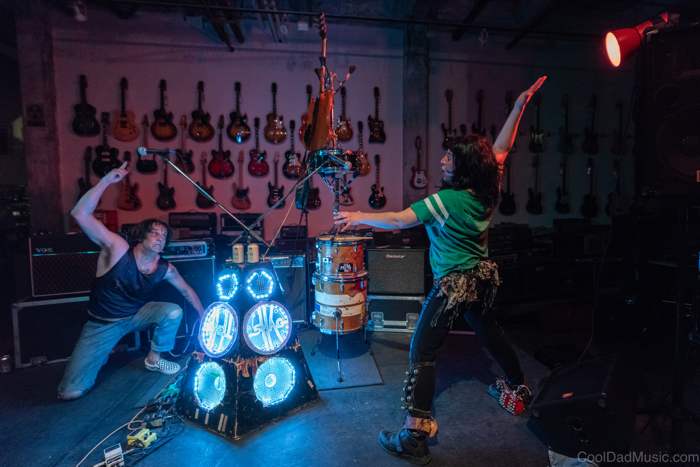
Photo by Jim Appio (Cool Dad Music)
Scene Point Blank: How has the response been from fans? Do people express any frustration or inconvenience?
Shellshag: A couple of fans have expressed that they missed having us on the platforms we left, but while supporting us all the same. We cannot speak for our fans however, so we will just say that we feel everyone already knows that this system is unbalanced, and we are not going to continue to put the responsibility on our fans. Instead we put that responsibility on ourselves not to offer all of our music to people in that way to begin with, and we are hoping to set an example for others to follow.
Is it scary? A little bit, yeah. But maybe it isn’t the streaming system that is at fault here. Maybe it is how we are using that system that is the problem.
We made music in a non internet world. We remember hearing a great song on the radio and going to the record store to buy the album to hear the other songs released. If we had heard the entire album on the radio, we may have have taped it on a cassette and saved ourselves the trip to the store. The big music streaming services are like a mainstream radio station that plays the entire album and makes the rest of the production pointless.
We repeat:
Individually, one may not feel that their behavior has a great negative impact on the world, but just as with recycling and global warming, collectively, our behavior has an irreversible negative impact on every aspect of our lives, and this includes how we choose to listen and share music and art.
Scene Point Blank: How has it gone so far? Any learning curves or issues in terms of getting music to your fans, etc that you didn't expect?
Shellshag: So far, it has gone really well, and we are not done tweaking our approach. One thing we can share, as a learning curve, is that artists should make sure they can find and reproduce the original masters for their music. Finding all the files and masters was a 6-month chore for us, and we are still re-uploading material.
It has been a good start, but it is only a start. We cannot make the impact needed alone. We need other independent labels, bands and listeners to join us in our quest, if not by changing their past, perhaps by changing how they deal with their music in the future. Everything we do, what Shellshag does and stands for, is simple, and the internet cannot give it to you. We are not bots, we are Shellshag. Follow up the quest, despite day, night, death and hell.
Scene Point Blank: The artistic process is complex. There is the actual creative process, but also the distribution and consumption of the product where it takes on a new life -- which is where this discussion falls. For some artists, all that matters is the creative process. How important is full control to you and why?
Shellshag: We love to collaborate with other artists and labels. At the starting moment of collaboration, no matter whether business or art, it is always good and everyone is at the same level of interest, passion and focus. As time goes on, folks move on, but we do not. No one will ever care about Shellshag as much as Shellshag does. The collaborations are temporary in that way, so when the passion fades for others, respectfully, we tend to move on without them.
We have never liked collaborating with the corporations or the music industry, but it is a necessary evil we must deal with, and that is why we are working hard to find a way to make that collaboration work better for us. So far, trusting the other side of that collaboration has only led to industry success and the billions of dollars the industry makes off of all of our collective participation. All of our collaborations have maintained passion from both sides for several years before waning, except for our collaboration with the industry. Their interest faded one second after we hit the submit button.
So with enough time, everything comes back into our hands, and that is as it should be. When others have moved on, we are still touring and performing on behalf of that same record more than a decade later -- that record and all the others. In this way, we are hesitant to give up any control for fear of being designated to the back shelves of an office somewhere. On the most popular streaming sites, we are left feeling like we are put on those dusty back shelves from the very beginning, and that is not how we see ourselves.
Scene Point Blank: Are there any particular artists or labels that inspired the current Shellshag model?
No, there really isn’t. We’ll just say that until we painfully took a look at what we had been doing, we did not realize that we had made a mistake that we wanted to change. Other bands may be hesitant to even take a look, because unlike us, most bands have more members, have put more of their music in the hands of record labels, and therefore have a much more complex internal discussion awaiting them. This may be causing them to avoid the topic altogether. We understand why everyone would avoid this discussion, as it puts all the relationships in question; the relationships of bands and labels, labels and distributors, and distributors and stores. Who is working for who? And why are distributors and stores getting all the money? We hope in time that they will have this discussion and make changes that will support a new approach to participation in the streaming system.
Scene Point Blank: I'll admit I hadn't thought about digital distributors at all. That concept makes some sense, but to me distribution implies a physical product so maybe there’s a disconnect in there. I think it's really important people know how much those "terms of use" you click on really are -- even more so if you're an artist.
"On the most popular streaming sites, we are left feeling like we are put on those dusty back shelves from the very beginning, and that is not how we see ourselves."
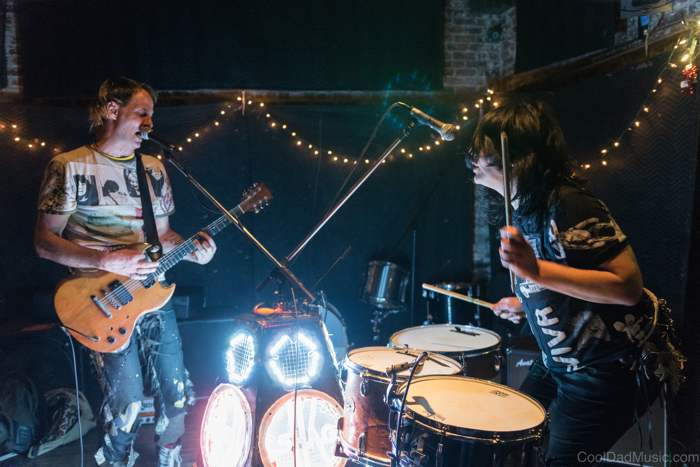
Photo by Jim Appio (Cool Dad Music)
Scene Point Blank: In discussing the challenges of digital distribution, you said "There are more than two options here. It doesn’t have to be a yes or no." That fits something I've been thinking about a lot in 2020. During the George Floyd uprising in Minneapolis, a local writer tweeted something to the effect of "Sometimes there's more than one thing happening at once." I think we get lost in thinking life is full of these binary dichotomies when it's rarely that simple. I'm not sure what my question is with that insight. I guess that you aren't saying that digital platforms are bad, but some certainly are and that it requires a more thoughtful look?
Shellshag: Yes, I think that is accurate. For us, a more thoughtful look was quickly followed by action. It has been easier for us to see the big picture from a starting over perspective.
The digital distribution is the key to both how this got ahead of us independent bands and why we can’t seem to do anything to challenge the payout system that streaming networks put in place. Every label or band that gets music up on the big streaming services does so through a digital distributor, or through an aggregate service, which is a company that has an agreement with a digital distributor, the same way our company Starcleaner Records does with Orchard Music. The aggregate services charge a yearly fee, so imagine those are like a record label that does not care what music they represent, as long as the bands all pay $30 a year. Business.
So, the digital distributors are the topic everyone should be talking about. We can all scream forever at Spotify and Amazon but, ultimately, the decisions are ours to make, and we make them through our digital distributors. So when we say we should band together and demand a business model that works for us independent bands, that starts with a discussion between labels, bands and their respective distributors.
The collective power of the underground is capable of creating our own business model by withdrawing content and limiting new content. We believe that the best way to utilize this streaming network is to treat it like a mainstream radio station, providing some songs to gather interest, and providing the rest of the songs on a different platform, maybe changing listening habits globally.

